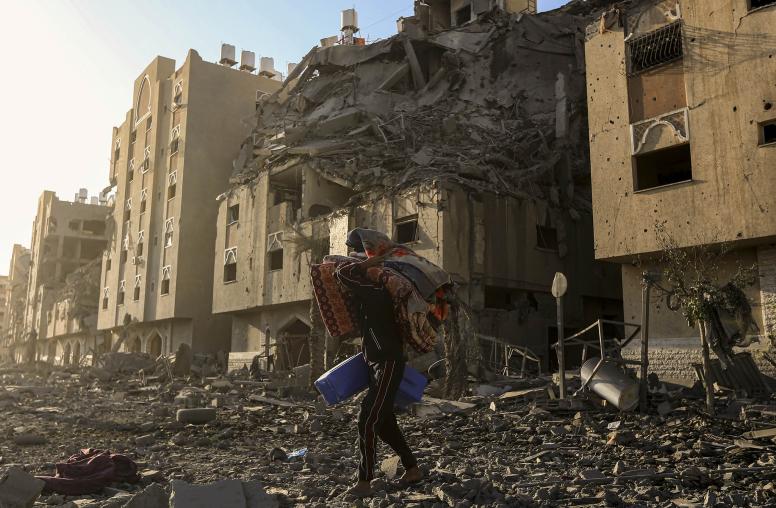Towards a Palestinian State: Is Institution-Building Succeeding?
Palestinian Prime Minister Salam Fayyad's government is midway through an ambitious two-year plan to build the necessary infrastructure for a viable Palestinian state. One-year on, our panelists assess its progress. This event, co-sponsored with the Carnegie Endowment for International Peace, marked the launch of a new U.S. Institute of Peace series on The Israeli-Palestinian Conflict: Internal Challenges on the Road to Peace.
On September 29th, 2010, USIP co-hosted a panel with the Carnegie Endowment for International Peace: "Towards a Palestinian State: Is Institution Building Succeeding?”
Panelists included Neil Kritz, the Senior Scholar in Residence in the Center for Mediation and Conflict Resolution at USIP, Howard Sumka, Acting Deputy Assistant Administrator for the Middle East at the US Agency for International Development (USAID), Nathan Brown, Nonresident Senior Associate of the Middle East Program at Carnegie, and Ghaith Al-Omari, Advocacy Director at the American Task Force on Palestine. The discussion was moderated by Lucy Kurtzer-Ellenbogen, Program Officer in USIP’s Center for Mediation and Conflict Resolution.
The Panelists provided their individual perspectives on the extent and significance of progress achieved one year since Prime Minister Salam Fayyad announced his ambitious two-year plan to build the necessary infrastructure for a viable Palestinian state. The key questions raised and discussed by the panelists were:
- What sectors have seen progress and how significant are these developments?
- Can progress be meaningful or sustainable absent a viable political process?
- How does the institution-building project relate to the peace process?
On the first question of progress, while all panelists agreed that there had been improvement on the ground since the inception of Salam Fayyad’s plan, there was disagreement over the extent to which such developments could be seen as state-building. Sumka pointed to significant examples of economic growth, including a 7 percent rise in GDP in 2009 for the Palestinian Territories and a reduction in unemployment, Kritz noted a positive change in the culture and application of citizen services across government sectors, and a marked improvement in the professionalism and independence of the judicial system, and Al-Omari noted the improved capacity of the Palestinian security forces. However, Brown questioned whether some of these improvements were meaningful signs of building a viable state apparatus as opposed to merely administrative building or even just administrative maintenance. He further argued that economic progress was more a factor of foreign aid pouring in than of internal processes, and that true progress was limited in comparison to the more significant strides in institution-creation that occurred under Yasser Arafat’s rule in the 1990’s. Al-Omari disagreed with the last point, stating that in the 1990’s the government was basically just a social security system that served to mask high unemployment and other systemic problems.
With regard to the nexus between state-building and the political process, the panelists differed over the necessary components for the realization of a Palestinian state. While the panelists agreed that the current Palestinian political system suffers from the division between the West Bank and Gaza and the weakened legitimacy of Mahmoud Abbas, even within his own party, they disagreed over the implications of such dysfunctions for the prospect of a Palestinian state. Brown argued that until such a broken political process is fixed, state-building is impossible, while Sumka noted the importance of focusing on building strong institutions in order to lay the foundation for a functioning state, and Al-Omari suggested that it is through improvements in the way government is functioning that Salam Fayyad is gaining increased popular legitimacy. Brown maintained that the leadership in the West Bank is ultimately authoritarian and can only issue technical improvements to existing legislation given the absence of a functioning legislature.
Finally, Al-Omari spoke to the relationship of the state-building plan to the peace process. He argued that improvements in the Palestinian security sector were creating a more trusting environment for negotiations due to increased Israeli confidence in Palestinian capacity, and positive cooperation between the two parties in this area. However, he and Sumka agreed that such improvements in security needed to be matched by progress in other sectors to avoid the impression that the Palestinian Authority is merely doing Israel’s work rather than advancing Palestinian interests.
Likewise, while broad international support for and confidence in Salam Fayyad’s state-building plan increases the pressure on Israel to make progress on the negotiations front, and while building institutions should be a process that is insulated and independent from the ups and downs of political negotiations, it will be important for Palestinians to see that the process is leading to eventual statehood. Kritz agreed, commenting that a commitment to improving institutions will wane if it becomes clear that there is no Palestinian state on the horizon. Returning to the issue of political legitimacy, Brown questioned the Ramallah leadership’s ability to implement a negotiated agreement with Israel even if it were possible to achieve it. In his view, therefore, fixing the political system is a necessary prerequisite both to success on the state-building and the negotiations front.
About the Series
The Israeli-Palestinian Conflict: Internal Challenges on the Road to Peace
Certain domestic Israeli and Palestinian concerns—from state institution-building and secular-religious divides, to coalition politics and educational reform—have strong implications for the broader conflict, and for international efforts towards a peaceful resolution. Through a series of panels and related publications over the course of the year, USIP will explore such critical yet oft-neglected internal dynamics.



